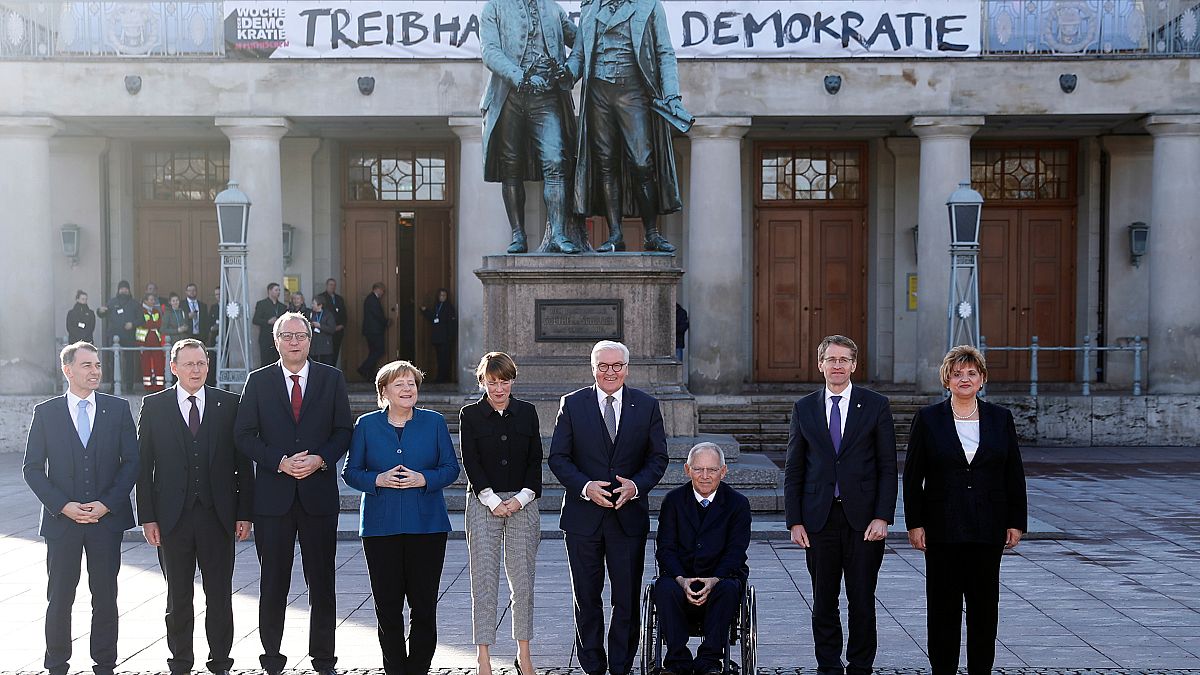Formed out of the bloodshed of World War One, Germany's first democratic experiment was overcome by Adolf Hitler's Nazis.
Stood in the central square of a small German town in August, 2019, Chancellor Angela Merkel warned that it was "the responsibility of every generation to struggle for democracy."
The town was Weimar and her speech came a century after the foundation of the Weimar Republic, Germany's first parliamentary democracy, forged out of the chaos and bloodshed of WW1.
Weimar did not end well: 14 years after its foundation, Adolf Hitler was chancellor and the Nazi party had begun its path towards dictatorship, war and the Holocaust.
But while the accepted wisdom has always been that it was Weimar's mistakes that paved the way for Hitler, others point to its successes: the election of 1919 was the first in which women could vote, while many of the republic's reforms found a place in what became Germany's welfare state.
What was the Weimar Republic?
Germany's Kaiser Wilhelm II abdicated on November 9, 1918 and two days later an armistice was signed between the left-wing Social Democratic Party (SPD) and the allies, ending World War One.
On the streets, communists and socialists clamoured for revolution, seeking to repeat the successes of the Bolsheviks a year earlier in Russia. But rather than back the protests, the SPD declared a republic and held elections for a new national assembly, which it won in early 1919.
On February 6, 1919, the assembly met to discuss a new constitution, choosing the small town of Weimar to get some respite from an increasingly hostile Berlin. It was finally passed in August.
What did it say?
The constitution increased the power of the republic rather than of the individual German states, with national legislation taking precedence over state laws.
Crucially, it also massively increased the power of the president, who would be elected independently, serve for seven years and could be re-elected. It also permitted the president to suspend civil liberties in the event of a national emergency - sowing the seeds for its eventual downfall.
What went wrong?
The Weimar Republic was a lot of things to a lot of people - which was one its main problems.
On the far left, it was seen as a betrayal of the socialist cause, because the SPD had chosen a national assembly over a workers' state and had brutally put down street protests in 1918 and 1919.
On the right, critics accused the national assembly of humiliating Germany by agreeing to the Treaty of Versailles, agreeing to reparations, territorial losses and cuts to the army. Far right parties openly called for the overthrow of the republic, with paramilitary groups waging a campaign of street violence.
The 1929 crash on the New York Stock Exchange marked the beginning of the Great Depression, with German unemployment sky-rocketing, wages falling and a rise in support for radical parties on both the left and the right. In 1933, Hitler became chancellor of Germany.
What is its legacy?
Writing in Süddeutsche Zeitun, Heribert Prantil argued that Weimar should be celebrated. Not only did bring an end to aristocratic government in Germany, but it introduced reforms including the eight hour work day and women's suffrage. In that, it was the birth of German democracy, he said.
But others see more sinister parallels, especially given the rise of the far right in Europe in 2019.
When Walter Lübcke, an official and defender of Merkel's open policy on refugees, was murdered in the city of Wolfhagen, Lesse, on June 2, 2019, German Foreign Minister Heiko Maas warned that Germany needed to recall the "dark memories" of the Weimar Republic.
